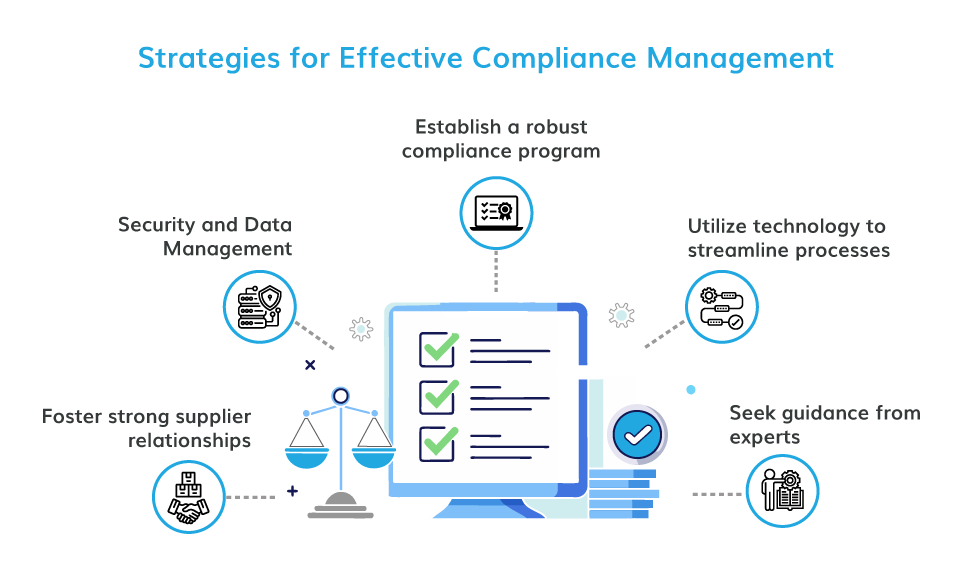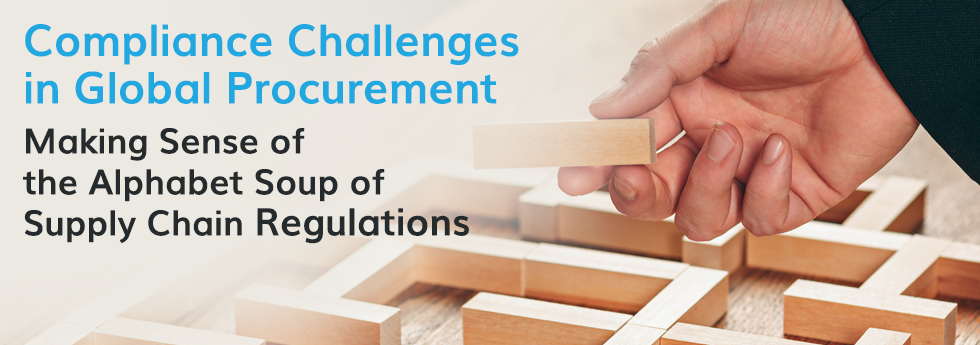Navigating compliance in global procurement has never been more complex. Organisations must operate across multiple regulatory environments, each with its own legal expectations, cultural nuances, and industry-specific obligations. From health and safety risks and sanctions to corruption concerns, labour rights violations, environmental responsibilities, and sustainability mandates, procurement teams need constant vigilance. Robust monitoring mechanisms, automated checks, and regular audits are now essential to prevent compliance failures. A proactive approach not only protects reputation and avoids penalties but also strengthens supplier relationships and supports long-term sustainability goals.
One of the biggest challenges is staying up to date with regulations that evolve rapidly. Today’s compliance landscape includes everything from import/export rules and customs regulations to ESG due diligence, traceability requirements, modern slavery laws, and global data privacy acts. Procurement teams must continuously track regulatory updates and ensure their sourcing decisions adhere to laws in both source and destination countries. Staying informed is no longer optional; it is fundamental to protecting organisational reputation and maintaining strong, compliant supply chains.
Table of Contents
ToggleThe Regulatory Landscape: The Alphabet Soup of Acronyms
Global procurement is governed by a long list of regulations, frameworks, and standards. These define how organisations operate, report, engage with suppliers, and ensure ethical, sustainable, and legally compliant sourcing practices.
Below is a streamlined overview of the most influential regulations shaping modern procurement:
Navigating Global Procurement’s Alphabet Soup of Acronyms
- Environmental, Social, and Governance (ESG)
- General Data Protection Regulation (GDPR)
- California Consumer Privacy Act (CCPA)
- Foreign Corrupt Practices Act (FCPA)
- Lieferkettensorgfaltspflichtengesetz (LkSG) or German Supply Chain Due Diligence Act
- Corporate Sustainability Reporting Directive (CSRD)
- European Union Corporate Sustainability Due Diligence (EUCSDD)
- Uniform Commercial Code (UCC)
- Federal Acquisition Regulation (FAR)
- Trade Agreements Act (TAA)
- International Labour Organization (ILO) Conventions
- UNCITRAL Model Law (United Nations Commission on International Trade Law)
- USMCA (United States-Mexico-Canada Agreement)
- EU Public Procurement Directives
- International Traffic in Arms Regulations ( ITAR )
- Know Your Customer (KYC)
- Anti-Money Laundering (AML) Regulations
Environmental, Social, and Governance (ESG):
A broad framework covering environmental impact, social responsibility, and governance practices. Multiple regulations now assess ESG performance and mandate transparent reporting.
General Data Protection Regulation (GDPR):
Comprehensive data privacy regulation applicable to businesses operating within the European Union (EU) and those handling EU residents’ data. It sets out stringent requirements for data processing, consent mechanisms, data breaches, and cross-border data transfers.
California Consumer Privacy Act (CCPA):
A privacy law requiring transparency around the collection and use of personal information for California residents.
Addresses bribery and corruption cases involving foreign officials. Applies to individuals, companies, and securities issuers that fall under U.S. jurisdiction.
Lieferkettensorgfaltspflichtengesetz (LkSG) or German Supply Chain Due Diligence Act:
Mandates human rights and environmental due diligence across global supply chains for German companies, with penalties for non-compliance.
Corporate Sustainability Reporting Directive (CSRD):
An EU directive requiring large companies to disclose sustainability performance and non-financial ESG-related data.
European Union Corporate Sustainability Due Diligence (EUCSDD):
Introduced in 2024, this directive strengthens responsible business conduct across global value chains, requiring detailed due diligence for social and environmental impacts.
Uniform Commercial Code (UCC):
A foundational U.S. legal framework that standardises how commercial transactions are executed across states. For procurement teams, it ensures consistency in contracts, delivery terms, warranties, and dispute handling, especially when dealing with multi-state suppliers.
Federal Acquisition Regulation (FAR):
A comprehensive rulebook governing how U.S. federal agencies source, evaluate, award, and manage contracts. It enforces transparency, competitive fairness, and strict documentation, making it a critical reference for any supplier or enterprise selling to the government.
Trade Agreements Act (TAA):
Defines which countries are eligible to supply goods and services to U.S. federal agencies. For procurement, it serves as a compliance checkpoint—ensuring sourced items meet approved-country origin requirements and align with federal procurement integrity standards.
International Labour Organization (ILO) Conventions:
A collection of global labour standards covering worker rights, child labour, forced labour prevention, workplace safety, non-discrimination, and ethical employment practices. Companies use ILO compliance as a baseline for responsible sourcing and supplier code-of-conduct frameworks.
UNCITRAL Model Law (United Nations Commission on International Trade Law):
A globally recognised blueprint for commercial contracting, arbitration, procurement, and dispute resolution. Many countries structure their procurement regulations based on UNCITRAL, making it a common point of reference for cross-border sourcing and contract governance.
USMCA (United States-Mexico-Canada Agreement):
The trade agreement that replaced NAFTA. It directly impacts tariffs, rules of origin, supplier eligibility, and cross-border documentation between the U.S., Mexico, and Canada—shaping how organisations source and manufacture within North America.
EU Public Procurement Directives:
A unified set of rules governing how public sector bodies across EU member states advertise, evaluate, and award contracts. The directives ensure transparency, cross-border competition, equal opportunity for suppliers, and consistent procurement ethics across the EU.
International Traffic in Arms Regulations ( ITAR ):
Strict U.S. controls on the export, handling, and sharing of defense-related equipment, software, and technical data. Organisations working in aerospace, defense, or dual-use sectors must ensure their suppliers, processes, and data flows remain fully ITAR-compliant.
Know Your Customer (KYC):
A regulatory requirement mandating businesses to verify the identity, legitimacy, and risk profile of suppliers before onboarding them. KYC checks help flag shell companies, fraud risk, sanctions exposure, and potential compliance violations early in the sourcing cycle.
Anti-Money Laundering (AML) Regulations:
A set of global and national regulations requiring companies to assess, monitor, and report suspicious financial activity within their supplier ecosystem. AML compliance ensures procurement isn’t unknowingly enabling money laundering, fraud, or financing of unethical operations.
Other Complexities in Compliance and Regulations
Sanctions:
International sanctions from bodies such as the UN, EU, and U.S. are updated frequently. They may include trade restrictions, asset freezes, and financial measures. Non-compliance can result in severe penalties and reputational harm.
Cultural and Linguistic Barriers:
Miscommunication across cultures and languages can complicate compliance. Clear communication strategies and cross-cultural awareness are essential for global supplier engagement.
Limited Resources:
SMEs often lack specialised compliance teams. Outsourcing or partnering with compliance experts can help manage complex global requirements.
Strategies for Effective Compliance Management

Establish a robust compliance program:
A well-structured compliance program with defined policies, procedures, and ongoing training keeps procurement teams informed and prepared. Regular training ensures teams can recognise risks and follow evolving regulations.
Utilize technology to streamline compliance:
Modern procurement platforms automate supplier screening, due diligence, contract compliance, and documentation workflows. Integration with global sanctions databases and supplier risk tools enhances visibility and reduces manual effort.
Security and Data Management:
Secure data management protects sensitive supplier information and ensures compliance with global privacy laws. Strong data governance also reduces risk of breaches and misuse.
Foster strong supplier relationships:
Clear expectations, regular audits, open communication, and partnerships built on ethical standards strengthen compliance across the supply chain. Including sustainability and social responsibility criteria in supplier selection further strengthens these efforts.
Seek guidance from experts:
Legal advisors and procurement compliance specialists offer valuable insights into regional regulations, risk management, and best practices for building a resilient, compliant sourcing framework.
By acknowledging these complexities and implementing proactive strategies, organisations can navigate the global procurement landscape more effectively, minimise compliance risks, and convert compliance into a strategic advantage. To understand how automating compliance activities can support your organisation, reach out to us at info@merlinsourcing.com and our experts will be happy to help.



